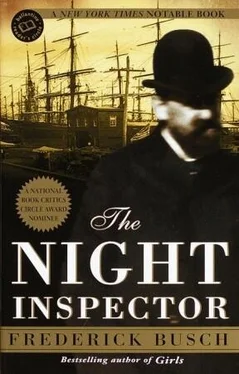“Of course not,” he said. I thought that he lied. He was on the trail of something, and I was included in his hunt. His jaw muscles worked, and he compelled his arms to stillness, his legs to be crossed one over the other, further wrinkling his crumpled brown suit. “But I am composing the memoir of which I spoke to you. It has taken a different turning, although it makes use of my experience at war. I read a book of poetry, poems about the War by someone outside its immediate experience.”
“Battle-Pieces,” I said. “He writes so many poems. I have to confess to you that I find his meter too irregular for my crude taste.”
“Yes, you with your New Haven degree.”
“I have learned that having it pays nothing.”
“What pays, then?”
“Profit.”
“This fellow reaps no profit. I know little of poetry. But, at the end of his book, he writes a commentary, I suppose you might call it. Prose, Billy. He’s a straight-talking man on the Negro question. And about not … hating.”
“The South?”
“Yes.”
“After years of laboring to kill them.”
“And them to kill us. He is a complex man.”
“Sam, he’s a Republican, and that’s their line, and that’s their Administration giving him his badge and his paycheck and his pension.” His face fell, and something about his dedication to the man I would employ brought my anger up. “So you found a whisper about the death of his son and you wrote a column lamenting it. You even wrote about his participation in that game played with a small ball—”
“Base ball, they call it. Yes. You read my column?” His face went boyish as he smiled his pleasure. “You see?”
“What’s that, Sam?”
“How necessary it is for a writer to be read? You see how foolish and full of moonbeams I grow when you say you’ve seen my words?”
“And you’re hunting him to see about a writer no one reads. The death provoked your interest in the life, in other words. Words again.”
“All words, Billy. All of it’s words.”
“Words may convey dollars,” I said.
“Ask the man without a son,” he argued.
“He has another son left to him. Stanwix.” Sam found a pencil and wrote down notes. “As I understand it, something about his older brother’s death has made him go deaf.”
“You see? And he cannot hear words , this son of a writer. It is, indeed, a story. It is a large story. How the United States will silence the voice of intellect, crush philosophical speculation, and stamp out the embers of our national literature. Have you read Charles Dickens on America?”
“I confess to not having read him on wherever it is he lives — the British Isles?” I was lacing my boots, but I looked up to smile for his enthusiasm. He could not tell. He looked distraught at my having not read Mr. Dickens. I made a note to read something by him, though my reading these days consisted of the newspapers and the news, in Mr. Morse’s code, on the telegraph in the Savarin downstairs in the Equitable Building: the rise in corn, the fall in pork bellies. From under the mask, I said, “Take your ease, Sam. Take a breath. Take your time. We’ll go to a coffeehouse and eat a breakfast and you’ll tell me where you’ve been and what you’ve done. For how long will your editor permit you to remain in the city?”
“Jack Herman is a scrupulously intelligent man who knows what’s news. He detests speculation, and he loves hard fact. He’ll give me a few days at the Astor. If need be, I’ll pay for more from my pocket. Or borrow it from you.” He grinned, and the grin grew wider. “ ‘The city,’ you said.” He was beaming now. “As if there were none other. You are a New Yorker, Billy.”
“It’s the capital of commerce, or soon will be.”
“And you’re a captain of commerce.”
“Or soon will be.”
“I love seeing you, Billy. I hate the damage done you by the Rebel marksman, but I am so pleased to be with my comrade again. You must permit me to be of service.”
We shook hands. His was atremble, and damp. I said, “And you me.”
“I fear,” he said, “that I will burst into tears or burst into song, and neither is a pretty prospect. You know the poor fellow. Tell me how you know him. Tell me stories about his state of neglect, and I’ll grow somber and professional.”
“He is a badge-wearing deputy inspector for the Revenue Service of the Port of New York. He carries government locks, and he impounds things, I gather, if he thinks it important to keep them from coming ashore. He drinks a good deal — too much, I would say. His relations with his family strike me as tense, to say the best of it. Now, of course, with his son dead, who knows? Perhaps the boy was Isaac to his Abraham.”
Sam looked up from writing his notes. “But the Lord delivered Isaac. He sent the angel to tell the father he might let the son live.”
“I do not claim the boy was sacrificed to the father’s God.”
“I believe you implied it, Billy.”
“You know, I believe that you’re right, Sam.”
He had been writing in his notebook as he stood. His face was clenched and his eyes were active, but it was not his face I was drawn to. Although his notebook was of black leather and Uncle Sidney Cowper’s brown, I was reminded of my uncle and of how I had dreamed my way to his notebook, and how I had dreamed of Sam. It is said that a successful trader knows to predict events. He may as well dream them, I thought. But then I remembered how, in my dream, someone was cruelly hurt, over and again.
Sam said, “What, Billy? You stand so still.”
“I was thinking, for some reason, of my uncle’s sorry death.”
“A recent loss?”
“No, you would have to call it a profit,” I said.
I led him from my room, through the dark hallway, and down to the street. He stood back against the grimy brick wall of our tenement to observe: a child with a hoop; three stalking, sneering boys of nearly twelve, their teeth yellow in their gray faces; a tot of no more than three in diapers who stood as his mother, a whore from the next street over, tried to trade her favors for something from the fishmonger’s wagon at the curbing. The sky was the color of soot, and flakes of it seemed to be drifting like coal-stained snow. The air smelled of heat and of metal, of the putrefaction of flesh. Sam’s eyes were huge. Mine, perhaps from the dirty air, were smarting, and I was noticing the edges of the eyeholes in the mask, something I did only when very fatigued; I knew that I would spend the day in watching the edges of the holes as much as I would see what they were turned to.
In their dim flat on White Street, toward Broadway, I found the Pastrowycz family at their breakfast, and I asked Mrs. Pastrowycz to permit me to give her son, Benny, some money to run a note to my Negro friend, Adam. I did not know whether Adam could read, but I knew that he was intelligent and would find someone, if he could not, to read out my request. She went back to frying something fatty for their meal while the three daughters sat staring at their platters. I frightened them, but nothing frightened Benny, who knew the neighborhood and who knew how to keep himself safe. He was a sweet fellow, chubby at the cheek and sturdy of chest and shoulder, with hair the color of sand, and pale skin. He reminded me a little of Burton, the private in our detachment to whom fell the wrangling duties and who sometimes made a kind of fried bread dipped in egg, when we could forage eggs, on which he poured a little sorghum molasses for a treat.
“See it into his hands, Benny. Go now, for you’ll have to trace him to the docks if you miss him. You’ll do that? And take this other one to the North River. You understand the place?”
Читать дальше












